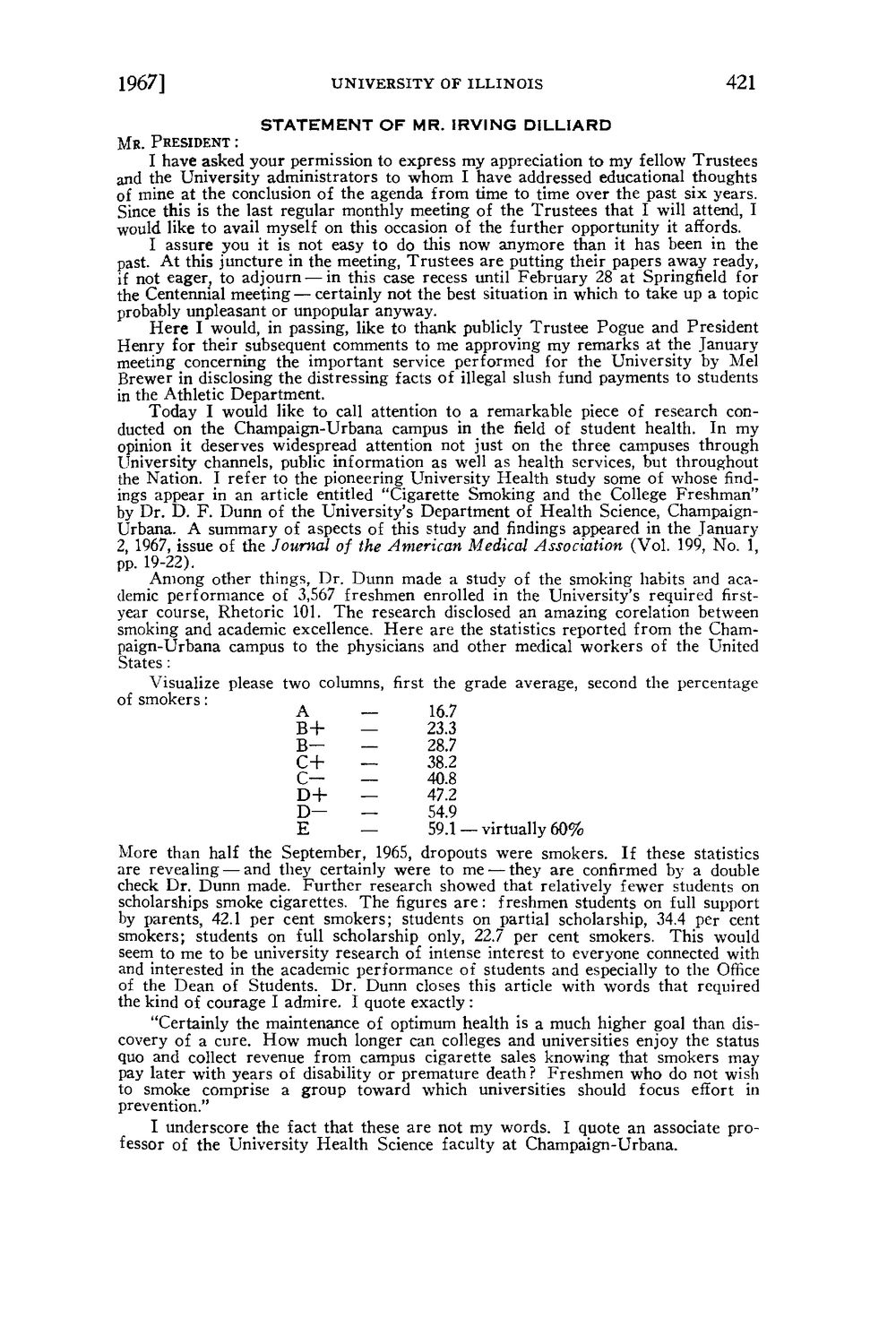| |
| |
Caption: Board of Trustees Minutes - 1968
This is a reduced-resolution page image for fast online browsing.

EXTRACTED TEXT FROM PAGE:
1967] MR. PRESIDENT : UNIVERSITY OF ILLINOIS STATEMENT OF MR. IRVING DILLIARD 421 I have asked your permission to express my appreciation to my fellow Trustees and the University administrators to whom I have addressed educational thoughts of mine at the conclusion of the agenda from time to time over the past six years. Since this is the last regular monthly meeting of the Trustees that I will attend, I would like to avail myself on this occasion of the further opportunity it affords. I assure you it is not easy to do this now anymore than it has been in the past. At this juncture in the meeting, Trustees are putting their papers away ready, if not eager, to adjourn — in this case recess until February 28 at Springfield for the Centennial meeting — certainly not the best situation in which to take up a topic probably unpleasant or unpopular anyway. Here I would, in passing, like to thank publicly Trustee Pogue and President Henry for their subsequent comments to me approving my remarks at the January meeting concerning the important service performed for the University by Mel Brewer in disclosing the distressing facts of illegal slush fund payments to students in the Athletic Department. Today I would like to call attention to a remarkable piece of research conducted on the Champaign-Urbana campus in the field of student health. In my opinion it deserves widespread attention not just on the three campuses through University channels, public information as well as health services, but throughout the Nation. I refer to the pioneering University Health study some of whose findings appear in an article entitled "Cigarette Smoking and the College Freshman" by Dr. D. F . Dunn of the University's Department of Health Science, ChampaignUrbana. A summary of aspects of this study and findings appeared in the January 2, 1967, issue of the Journal of the American Medical Association (Vol. 199, No. 1, pp. 19-22). Among other things, Dr. Dunn made a study of the smoking habits and academic performance of 3,567 freshmen enrolled in the University's required firstyear course, Rhetoric 101. The research disclosed an amazing corelation between smoking and academic excellence. Here are the statistics reported from the Champaign-Urbana campus to the physicians and other medical workers of the United States : Visualize please two co lumns, first the grade average, second the percentage of smokers: A — 16.7 — 23.3 B+ B — 28.7 — 38.2 C+ — 40.8 47.2 D+ — D — 54.9 E — 59.1 — virtually 609 More than half the September, 1965, dropouts were smokers. If these statistics are revealing — and they certainly were to me — they are confirmed by a double check Dr. Dunn made. Further research showed that relatively fewer students on scholarships smoke cigarettes. The figures a r e : freshmen students on full support by parents, 42.1 per cent smokers; students on partial scholarship, 34.4 per cent smokers; students on full scholarship only, 22.7 per cent smokers. This would seem to me to be university research of intense interest to everyone connected with and interested in the academic performance of students and especially to the Office of the Dean of Students. Dr. Dunn closes this article with words that required the kind of courage I admire. I quote exactly : "Certainly the maintenance of optimum health is a much higher goal than discovery of a cure. How much longer can colleges and universities enjoy the status quo and collect revenue from campus cigarette sales knowing that smokers may pay later with years of disability or premature death? Freshmen who do not wish to smoke comprise a group toward which universities should focus effort in prevention." I underscore the fact that these are not my words. I quote an associate professor of the University Health Science faculty at Champaign-Urbana. c-
| |